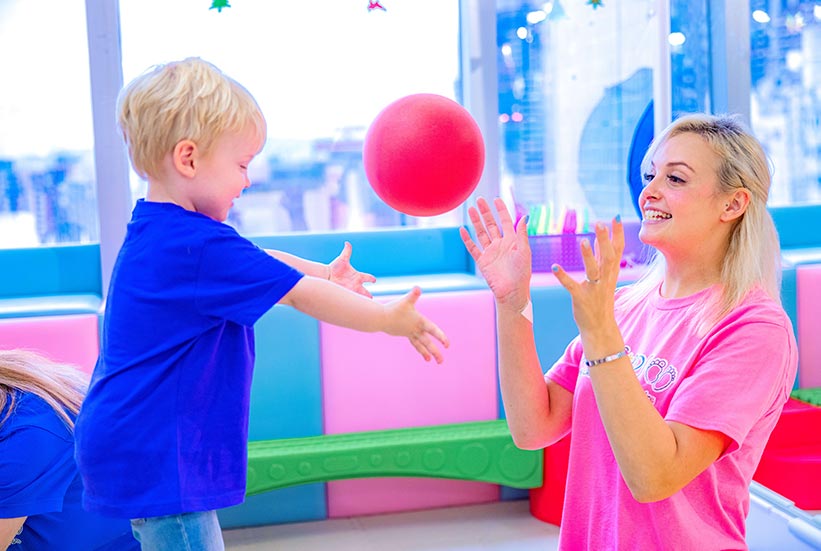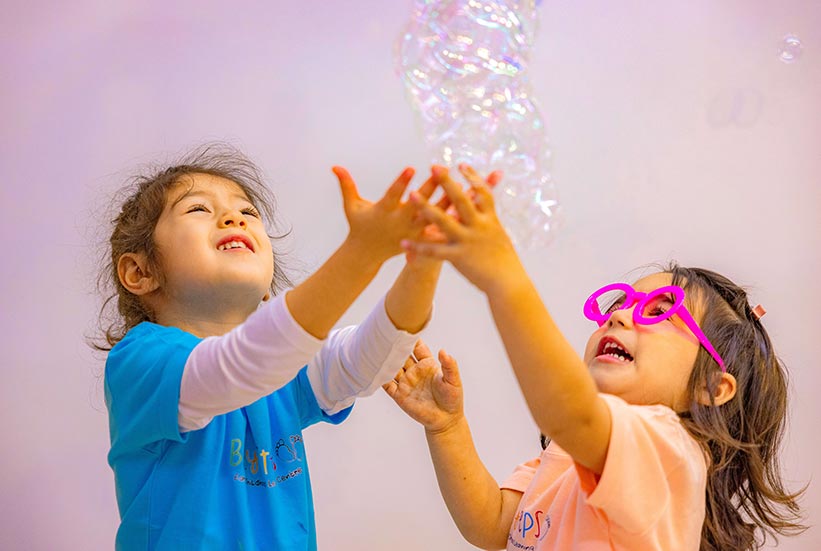




Our curriculum comprises five learning dimensions, addressing different aspects of a child's growth and development:
The first stage of learning at BabySteps, called Explore, takes place between 6 to 12 months of age. During this period, babies' curiosity and sensory learning are at their peak. They engage in various activities to explore and learn about their environment, including visual exploration where they can see and recognize human faces. Additionally, this stage is where babies first experience different emotions, making them explore different feelings through activities that promote emotional development. They also begin to recognize auditory stimuli, such as the melody of their mother's voice, and engage in kinesthetic learning by exploring their first few basic movements like crawling, learning how to stand, and the pre-walking stage by grabbing, sitting, and reaching.
Between the ages of 13 to 20 months, toddlers at BabySteps go through the Discovery stage, where they rapidly develop their motor skills and gain confidence in learning new motor skills activities such as walking, jumping, and running. They may also enjoy climbing stairs or furniture with assistance, playing with balls, and building small structures with blocks or crayons. At this stage, children also begin to recognize and name common objects and images through both visual and auditory memory.
Their language and communication skills continue to grow as they understand more complex sentences and imitate familiar words and sounds. They show their excitement through laughter, shouting, and making various noises. Along with this, their emotional intelligence advances, and they start experiencing complex emotions such as excitement and anger. They learn to express themselves and their feelings better by saying "no" or showing affection through hugs or kisses.
During this stage, which is typically between 18 to 24 months, your toddler's brain is rapidly developing nerve connections and pathways through their experiences and what they learn. They start to mimic people around them and repeat what they hear, leading to an increase in their vocabulary and language skills. They can experiment with new words every week to describe things they see, their body parts, and even animal sounds. They may also start pointing to familiar objects in picture books.
Your child will learn to follow instructions, ask for "more," and may start questioning why they are asked to do something. At this stage, most toddlers know about 50 words and use two or more words to express their needs or describe what they see. They may also start to associate words with feelings, such as "happy and sad."
Furthermore, your toddler may start showing a preference for using one hand over the other, which is an indication of their fine motor skills development. They become better at activities like kicking or throwing a ball, scribbling with a pencil, and building with blocks.
From 2.5 to 3.5 years of age, children reach a phase where they can apply their knowledge from earlier stages, which was gained through Exploration, Discovery, and Learn. Since birth, the number of synapses per neuron has increased dramatically, allowing them to learn at a fast pace.
During this phase, children are able to communicate and express themselves, and are ready to learn the basics of reading and writing in preparation for their schooling. They continue to develop their motor skills, including gross and fine movements such as running, jumping, and holding objects with an adult-like grip. These abilities help to further strengthen their bones and muscles, readying them for more challenging physical activities in the future.
At this stage, children's audiovisual abilities and interests are at their peak, which enhances their cognitive and sensory development. This is a crucial period for their growth and development, as they continue to lay the groundwork for their future academic, social, and emotional achievements.
The "Achieve" aspect of learning is designed to help young children improve their skills and knowledge by practicing regularly and striving for further progress. By the time they reach 3.5 to 6 years of age, children have already progressed through the first three stages of learning and are ready to tackle the challenges of education and social interaction. They are able to attain their objectives by consistently practicing and repeating what they have learned, and they become more self-sufficient and self-aware, which allows them to explore their interests and passions with confidence. They are also able to take on more challenging tasks, such as problem-solving, cycling, and playing sports, and continue to improve their fine and gross motor abilities, enabling them to engage in more complex physical activities such as running, jumping, climbing, and skipping. Their writing and drawing skills become more refined and imaginative, and they are also better able to use scissors and other tools with precision and accuracy.
As they get older, their cognitive abilities progress, allowing them to think logically, connect various concepts, and enhance their problem-solving abilities. Their language abilities also improve, allowing them to communicate more effectively and express themselves clearly to others. Children develop stronger social connections and relationships with their peers, develop empathy and emotional intelligence, and learn to follow social norms and regulations. They learn to collaborate and play cooperatively with others.
Overall, this stage is critical for children's development and growth as they prepare to enter formal education and develop their abilities in a more structured environment.
